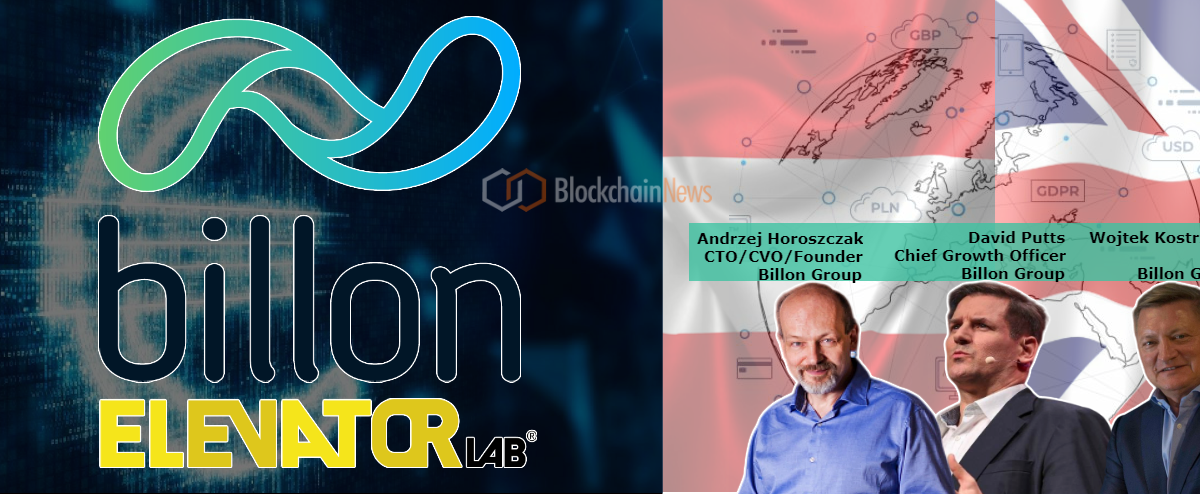Long-time Polish-UK trans-European project Billon has recently been selected by Raiffeisen Bank International (RBI) to showcase their technology in the bank’s Elevator Lab Partnership Program. The awarded idea, presented during the final qualification round on 17 October 2019 in Vienna, is a distributed ledger technology (DLT) based digital cash platform enabling transactions with tokenised euro stored on the blockchain.
“Participation in the Elevator Lab program is a chance to forge a partnership with a large international financial institution and a leading bank in Central and Eastern Europe, something that Billon aspired to since the company was created. Seeing RBI’s eagerness to implement innovative technologies, I am confident this collaboration will have a very strong and positive effect on our business,” says Wojtek Kostrzewa, CEO of Billon Group.
Billon plans to demonstrate its proven technology, showcasing the capability to mint, transfer and redeem regulated currency on a distributed ledger. The Polish-British fintech will work with RBI to use the platform for interbank or intercompany transfers of funds and settlement with digitised euro. Later, the scope of work can be expanded with mass payouts of funds from corporates to individuals, merchant accounts for e-commerce and e-money accounts for individual customers.
“We have selected Billon as an Elevator Lab participant because Raiffeisen Bank International is interested in applications of the distributed ledger technology. Over the next months, we will be testing Billon’s solution and evaluating the potential added value for our customers,” says Maximilian Schausberger, head of fintech partnerships at Raiffeisen Bank International.
The Elevator Lab program seeks partnerships with the best fintech startups operating in central and eastern Europe and offering, among others, fintech and AI solutions. This year, over 280 companies registered for the third edition of the program. In addition to Billon, five companies finally qualified to the acceleration phase:
- Uhura Solutions from Montenegro (using AI to verify and draft contracts)
- imVision from Israel (an API security platform)
- Minna from Sweden (subscription management for online banking systems)
- Quantoz from the Netherlands (blockchain payments for IoT devices)
- Nayax from Israel (cashless payments)
In the next few months, companies participating in the partnership program must create a proof of concept, showing that their technology can work with RBI’s systems and processes and generate added value for the bank. Billon and other finalists will present their PoC in Vienna on Demo Day, scheduled to take place on March 5, 2020. On this basis, RBI will evaluate possible cooperation.
“In the following months, we will take part in monthly acceleration workshops in Vienna. This will help us adapt our idea to the bank’s internal structure and regulatory requirements in Austria,” added Wojtek Kostrzewa.
Billon was originally established in Poland in 2012, and claim to have created the first enterprise DLT system, unifying national currency transactions, document management, and identity management into a single architectural system. Following several years of R&D in Poland, Billon UK was incorporated in 2016.
Its unique DLT protocol has been supported by many R&D grants, including the EU Horizon 2020 program. Billon is licensed to issue electronic money by regulators in the UK and Poland and employs a global team of more than 80 professionals in its two offices in London and Warsaw.
The highly innovative company first solved the challenge of transacting micropayments at scale, and now also claim to be able to encrypt documents and data on-chain, unleashing the transformational capacities of DLT in the regulated world. Billon’s high-performance DLT system is designed to deliver tangible business results in the areas of Account & Transactions, Trusted Documents, and Identity & Data Sharing.
Billon actively works to implement its technology commercially with leading business partners, such as FIS in the US and BIK (the Polish credit office) in Poland. In 2018, the company won the Global FinTech Hackcelerator competition at the Singapore FinTech Festival, showcasing a solution to zero-cost blockchain micropayments. Billon is currently taking part in the Elevator Lab accelerator by Raiffeisen Bank International, working on e-money transactions with digitised euro on DLT.
For more information, visit www.billongroup.com.
Founded in 2017, the fintech partnership program of RBI focuses on innovative ideas and solutions in the areas of Advanced Analytics & Artificial Intelligence, RegTech, Large Corporates & Institutional Clients, Payments and Transaction Processing for Mobility Services, Retail Banking, SME Banking, Cyber Security and FX Solutions. The largest program of its kind in CEE aims at long-term cooperation with these fintechs. For more information, visit elevator-lab.com.
- Polish-British Blockchain Company Billon to Digitise Euro in Deal with Raiffeisen Bank International – November 5, 2019
- 500.com Limited Releases Intel on Blockchain Technology for China’s Lottery Industry – November 4, 2019
- Oxfam, Etherisc, and Aon Find Success with First Blockchain-Based Agricultural Insurance Policies for Smallholder Farmers in Sri Lanka – November 4, 2019
- Interview: Brock Pierce and Two Prime’s Alexander S. Blum – November 4, 2019
- Samsung Bullish on Blockchain – Pushing for Developers on New Samsung Blockchain Platform SDK – November 1, 2019
- Busted: SEC and CFTC Nail First Global Credit – a Swiss Security-Based Bitcoin Swaps Dealer That Allegedly Aimed at American Investors – November 1, 2019
- Zilliqa and Oxford Women in Computer Science Society Join to Bring Diversity to Blockchain Sector – November 1, 2019
- VeganNation Add Brazilian Football Superstar Cafu to It’s Advisory Board – October 31, 2019
- Alliance Investments Announces Plans Tokenization of £500m in UK Real Estate in STOs – October 31, 2019
- Blockchain Gaming Project Immutable Sells out US$6.2 Million Genesis Sale – October 31, 2019
- Twitter and Square CEO Jack Dorsey Backs ICO Exchange Platform Coinlist – October 30, 2019
- Mastercard Teams Up With Envisible to bring Traceability to Food Supply Chain in Topco Stores – October 30, 2019
- Korean Mobile Payment App Chai Reaches 500K users in 4 months – $54 million in Transactions – October 30, 2019
- Quantum Resistant Ledger (QRL) Foundation Announces New Research Arm – Seeking Four Post-Quantum cryptographers – October 25, 2019
- Thailand’s SEC Approves ICO Platform – Leading the Region in Progressive Token Regulations – October 25, 2019
- Chinese President Xi Jinping Vows to Accelerate Blockchain Technology Innovation in China – October 25, 2019
- World Economic Forum Teams up with Seven Mining, Metals Companies On Blockchain-Driven Supply Chain Solution – October 25, 2019
- Opera Officially Adds Bitcoin To It’s Crypto Wallet – October 25, 2019
- UAE Royals Acquire 15% Stake In Cryptocurrency Tracker, Crypto Price Index – October 25, 2019
- Consensys Space – Crowdsourcing Solutions to Track Orbital Satellite Traffic Jams – October 25, 2019






